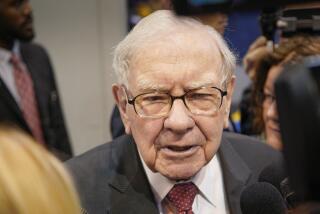Firms Find Long-Term Rewards in Doing Good
On the evening of Dec. 11, 1995, while returning home from his surprise birthday party, 70-year-old Aaron Feuerstein received horrible news: A fire had just swept through his Lawrence, Mass., factory, destroying three buildings.
For other companies, such a tragedy could have resulted in a work shutdown, relocation to cheaper turf and massive layoffs. But the president and chief executive of Malden Mills, which employed 2,600 people, had other plans.
Assembling his work force, Feuerstein announced that he was going to rebuild the plant, continue paying all employees their full salaries for the next 90 days, and all workers could remain at his company.
These promises would cost him $15 million.
Feuersteinâs announcement made national headlines. He was praised by President Clinton, bestowed honorary doctorates by prestigious universities and sent hundreds of thousands of congratulatory letters from people throughout the United States.
But Feuerstein was puzzled by all the attention. âWhat?â he later asked. âFor doing the decent thing?â
Since the era of the robber barons, American business has enjoyed a heady, almost single-minded fixation on the bottom line.
âGreed is a virtue,â disgraced trader Ivan Boesky once said, echoing the winner-take-all sentiments of a billion-dollar food service company founder: âWhat do you do when your competitor is drowning? Get a live hose and stick it in his mouth.â
But in the warmer, fuzzier â90s, a new breed of corporation is emerging: âThe Do Good Co.,â whose leaders place principles before profits and karma before capitalism. Many are based in New England, where the first American corporations were created more than 200 years ago.
Often they are run by Woodstock-influenced boomers--âthe generation that didnât exhale,â jokes Gary Hirshberg, chief executive of Stonyfield Farms, a New Hampshire-based yogurt producer known for its pro-environmental policies. And many are proving that, despite sometimes dire predictions of hard-nosed analysts, they can do good and prosper.
Feuerstein certainly demonstrated this, although returns on investments were not on his mind when he assured his employees that he would keep them on the payroll. âCorporate America has made it so that when you behave as I did, itâs abnormal,â he said.
Yet Feuersteinâs short-term financial sacrifice produced long-term rewards: increased employee devotion and productivity and skyrocketing sales. Whereas the companyâs pre-fire 1995 sales totaled $400 million, its projections for the upcoming year total $500 million.
All corporate leaders face dilemmas that force them to make âright vs. rightâ decisions. Harvard Business School Professor Joseph Badaracco Jr. calls these occasions âdefining moments.â
The traditional 20th century corporate leader ran his firm with shareholdersâ interests exclusively in mind, as Nobel Laureate economist Milton Friedman advocated. To do otherwise, Friedman said, would be a breach of fiduciary duty toward the shareholders.
But broad-minded company leaders assess the needs of numerous stakeholders: employees, customers, stockholders, suppliers, lenders, communities and society at large. According to Carol Cone, chief executive of Bostonâs Cone Communications, who studies such firms, these corporations will be prevalent in the 21st century. âThe public is starting to demand that businesses make social issues a part of their strategies,â Cone said.
Indeed, many companies, both publicly and privately held, are already taking actions that would have choked Gordon Gecko, anti-hero of the film âWall Street.â
Take Minneapolis-based Honeywell Inc. Although the company could greatly reduce labor costs by moving its operations from the impoverished inner-city district where it has operated for 112 years, it stays put. Why? Because it is creating jobs for the communityâs residents. âOur company was founded here, got its first bank loan here and hired its first employees in this community,â Honeywellâs Andre Lewis says. âAnd now we are going to stay and be a part of the solution.â
Can a do-good company ever be too good for its own well-being? Yes, says Harvard Divinity Schoolâs Brent Coffin, if it loses sight of its overall purpose.
âIt takes ongoing work to sustain the doing good and the doing well,â Coffin says. âThe marketplace puts oneâs convictions to the test. A business is not a philanthropy, social aid service or school. And if it tries to be all things to all people, it wonât be able to fulfill its mission.â
John Hood, president of the John Locke Foundation in Raleigh, N.C., and author of âHeroic Enterprises: Business and the Common Goodâ (Free Press, 1996) agrees. âSome companies may be putting self-aggrandizement before their purpose,â says Hood. âThey need to remember that their shareholders are not empowering them to manage charities but are asking them to manage their corporations.â
Sometimes a company will take short-term losses to achieve intangible long-term benefits--the kind that might not show up on their financial statements. Cone refers to this as investing in the Goodwill Bank. âThey do something to warrant the communityâs respect, and the community shows its appreciation in return,â Cone says.
McDonaldâs Corp., long praised for its civic attentiveness, might exemplify a Goodwill Bank depositor. After 21 people were slain at a San Diego County McDonaldâs restaurant in 1984, the company quickly bulldozed the building and donated its site to the city.
Eight years later, during the Los Angeles riots, the Goodwill Bank may have paid McDonaldâs some surprising returns. The corporation had been an aggressive employer of residents in the inner city, even stipulating in its leases that it would hire from the community. During the civil disturbance, no McDonaldâs restaurant was harmed--although many other fast-food outlets were razed and vandalized.
What compelled Fountain Valley-based Kingston Technology Corp. founders John Tu and David Sun to give their employees a $100-million bonus package last year after selling 80% of their corporation to a Japanese concern? Certainly not quick financial returns. They could have kept the money for themselves.
What compelled actor Paul Newman to found Newmanâs Own? The company is the only one in America to donate 100% of its after-tax profit to charity--a stunning $90 million over 15 years. âThere are many other people who could do what Paulâs doing,â says his vice president, Ursula Hotchner. âBut I guess they want to have it in their pockets. Paul is so excited about this company. He always says, âThis gives me a great kick.â â
Perhaps what compels these companies and other do-gooders like them are the words of Muhammad: âA personâs true wealth is the good he does in this world.â
More to Read
Inside the business of entertainment
The Wide Shot brings you news, analysis and insights on everything from streaming wars to production â and what it all means for the future.
You may occasionally receive promotional content from the Los Angeles Times.










